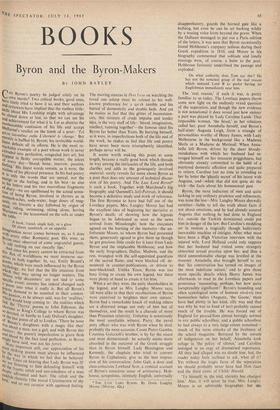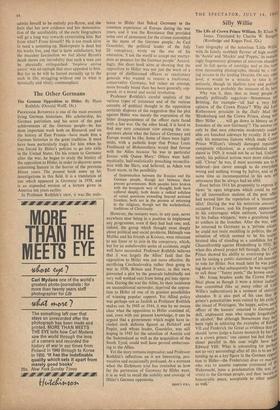BOOKS
Byron and the Byron-Makers
By JOHN BAYLEY
CAN Byron's poetry be judged solely on its
, own merits? Two critical books, good ones, have lately tried to have it so, and their authors and reviewers have implied that the endless tittle- tattle about His Lordship might with advantage be closed down at last, so that we can see his
real achievement for what it is. Let us dismiss the inexhaustible confusion of his life and accept
1Viallartri6's verdict on the tomb of a poet: 'Tel
glien lui-nrente enfin L'eternite le change.' But eternity is baffled by Byron; his invincible world- liness defeats all its efforts. He is the most re- Markable example of a poet whose work is never extruded into perfection, congealed into art, but irapped in fleshy corruptible matter, the juices re' every day—'blood,bone, marrow, passion, feeling His finest words remain, as it were, the v.'etims of his physical presence. In his bad poetry it is Only the words that are unreal, not the e.ner8Y or the feeling, and in his best—as also In his letters and his two marvellous fragments diarY----We are spellbound by the actual sensa- n,.0n of being Byron, involved in rhymes as in stomach-aches, soda-water, huge doses of mag- nesia, six biscuits a day followed by orgies of s4ak, riding, swimming, sitting alone, having
arianna or the housemaid on the sofa or under the table.
A book, friend, single lady, or a glass Of claret, sandwich, or an appetite . . . 8Ination never comes between us, as it does "tb every other Romantic poet. His wine, as ..Yron once observed of some ungrateful guests, Is still reeking on our rascally lips.'
thnd since his poetry. cannot be extracted from sells flux of worldliness we must immerse our- selves„ves in both together. In, say, Emily Bronte's „ oi"ents, which were much influenced by the Byron ‘,/vtilk°108Y, we feel that the life situation from Vic” tbeY may spring no longer matters. The s teen wild decembers' are not tied to some aP.eelfie event; eternity has indeed changed such PoPenem into what it really is. But all Byron's 14,nls demand to be reunited to their context. Iv-1s. Passion, as he always said, was for 'realities,' ii„kleh Would keep coming in: the realities which the `Thyrza' poems to John Edleston, the sconorister at King's College to whom Byron was or devoted, or Ianthe to Lady Oxford' i daughter, of the last poem of all to Loukas. 'There be none , neauty's daughters with a magic like thee' :As about a man, not a girl, and with Byron this ':tiactifers: bloodthe poem' A imperfection is given flesh i
by the fact (and perfection, as Byron
tibt hod
said, was not his forte).
trio ,ore important still, our appreciation of his by most striking poems must always be influenced the way in which we feel that he behaved. tare 'Lines on hearing that Lady Byron was ill' all ,a,tre listening to him defending himself with (kele frantic relish and one-sidedness of a man ead1),„.Y affronted and hurt. The relish and the iord`:;s11 rhetoric ('the moral Clytemnestra of thy and so on) co-exist with agonised feeling.
The moving stanzas in Don hint, on watching the loved one asleep must be related to his well- known preference for a qu'ck tumble and his hatred' of domesticity and double beds. And yet he makes us feel that this glitter of inconsisten- cies, this mixture of crude impulse and tender idea, is the very stuff of life: 'blood, imagination, intellect, running together'—the famous ideal fits Byron far better than Yeats. By burying himself, as it were, in imperfections both of the life and of the work, he makes us feel that life and poetry have never been more triumphantly identified, perhaps never will be.
It seems worth making this point at some length, because a really good book which threads its way among the intricacies of the life, and both clarifies and adds to the grotesquely involved material, surely reveals far more about Byron as a poet than does any amount of technical discus- sion of his poetry. And The Late Lord Byron* is such a book. Together with Marchand's big biography and Quennell's Self-Portrait, it should become a definitive study and work of reference. The first Byronist to have had full' use of the Lovelace papers, Mrs. Langley Moore has had the excellent idea of beginning her narrative at Byron's death; of showing how the legends began to be fabricated as soon as the news arrived from Missolonghi; how the executors agreed on the burning of the memoirs—the un- fortunate Moore, to whom Byron had presented them, generously agreed to give them up though he got precious little credit for it later from Lady Byron and the implacable Hobhouse; and how the early biographers, Dallas, Medwin, and the rest, wrangled with the self-appointed guardians of the sacred flame, and were blocked off, de- nounced in counter-publications, or driven to near-blackmail. Unlike Yeats, Byron was too busy living to create his own legend, but there were plenty at hand to create it for him.
What a set they were, the early shareholders in the legend, and as Mrs. Langley Moore says, 'all were alike in that their recollections of Byron were contrived to heighten their own stature.' Byron had a remarkable knack of making others see a distorted image not only of him but of themselves, and the result is a charade of more than Proustian relativity. Trelawny is notoriously the most unreliable witness; Parry, the naval petty officer who was with Byron when he died, probably the most accurate. Count Pietro Gamba, Countess Guiccioli's brother, is by far the nicest and most disinterested : he actually seems more absorbed in the outcome of the Greek struggle than in Byron himself. Lady Blessington and Kennedy, the chaplain who tried to convert Byron in Cephalonia, give us the best impres- sion of his conversation; John Galt, a dour and class-conscious Lowland Scot, a comical account of Byron's tenacious sense of aristocracy. Hob- house, scrupulous, intensely English, universally
* THE LMIE LORD BYRON. By Doris Langley Moore. (Murray, 42s.)
disapprobatory, guards the horned gate like a bulldog, but even he can be set barking wildly by a teasing voice from beyond the grave. When the Dallases managed to put out a Paris edition of the letters, it was seen that Byron occasionally found Hobhouse's company tedious during their Greek expedition in 1810, and Moore in his biography commented that solitude and lonely musings were, of course, a balm to the poet. Hobhouse furiously underlined the passage and exploded: On what authority does Tom say this? He has not the remotest grasp of the real reason which induced Lord B to' prefer having no Englishman immediately near him.
The. 'real reason,' if such it was, is pretty familiar to us today. The Lovelace papers throw
some new light on the endlessly vexed question of the separation, and though the new evidence is not sensational it does reveal just how sinister a part was played by Lady Caroline Lamb. That impossible woman, 'the beast,' as her relations called her, poor Annabella herself, and Byron's half-sister Augusta Leigh, form a triangle of personalities worthy of Henry James, with Lady Melbourne in the background like a Madame Merle or a Madame de Merteuil. When Anna- bella left Byron, driven by the sheer bloody- mindedness with which her husband had re- venged himself on her innocent priggishness, but obviously already committed to the habit of a martyred domestic affection and quite prepared to return, Caroline lost no time in revealing to her by letter the 'ghastly secret' of his incest with Augusta, and—when that did not quite do the trick—the facts about his homosexual past.
Byron, the most indiscreet of men and quite lacking in any ordinary prudence and refinement, was none the less—Mrs. Langley Moore shrewdly surmises—liable to tell the truth about facts if not about emotions, and he had already assured Augusta that nothing he had done in England (i.e. outside the Turkish dominions) could put him in danger of the law. But Caroline's meddling set in motion a tragically though ludicrously inexorable machine of intrigue. After what must have been a High Victorian interview with the injured wife, Lord Holland could only suppose that her husband had visited some strangely abnormal sexual practice upon her, and thus a third unmentionable charge was levelled at the monster. Annabella also brought herself to say that 'his conversation has turned on images of the most indelicate nature,' and to give those more specific details which Henry James was afterwards to read in the Lovelace papers and pronounce 'nauseating, perhaps, but how quite inexpressibly significant!' Byron's bounding and often scatological sense of humour vis-à-vis two humourless ladies (Augusta, 'the Goose,' must have had plenty in her kind, silly way and that was why he was so fond of her) probably caused much of the trouble. He was forced out of England for peccadilloes almost boringly normal in any public schoolboy, and a public schoolboy he had always to a very large extent remained— much of his verse smacks of the liveliness of the school magazine. Betrayed by the onrush of indignation on her behalf, Annabella took refuge in 'the policy of silence,' and Caroline indulged in an orgy of dramatised repentance. All they had alleged was no doubt true, but, the reader today feels inclined to ask, what of it? Yet without the tragic farce of the separation we should probably never have had Don Juan and the third canto of Childe Harold.
`To himself, in the end, eternity has changed him.' Alas, it will never be true. Mrs. Langley Moore is an admirable biographer, but she admits herself to be entirely pro-Byron, and she feels that her new evidence and her demonstra- tion of the unreliability of the early biographers will go a long way towards exonerating him. But from what? From himself? He is too much alive to need a summing-up. Shakespeare is dead but his works live, and that is quite satisfactory, but the macabre fascination we feel about Byron's death shows our incredulity that such a man can be physically extinguished. implora eterna quiete' was an epitaph that once appealed to him. But for us he will be buried eternally up to the neck in life, struggling without end in what is heroically and vitally commonplace.



































 Previous page
Previous page